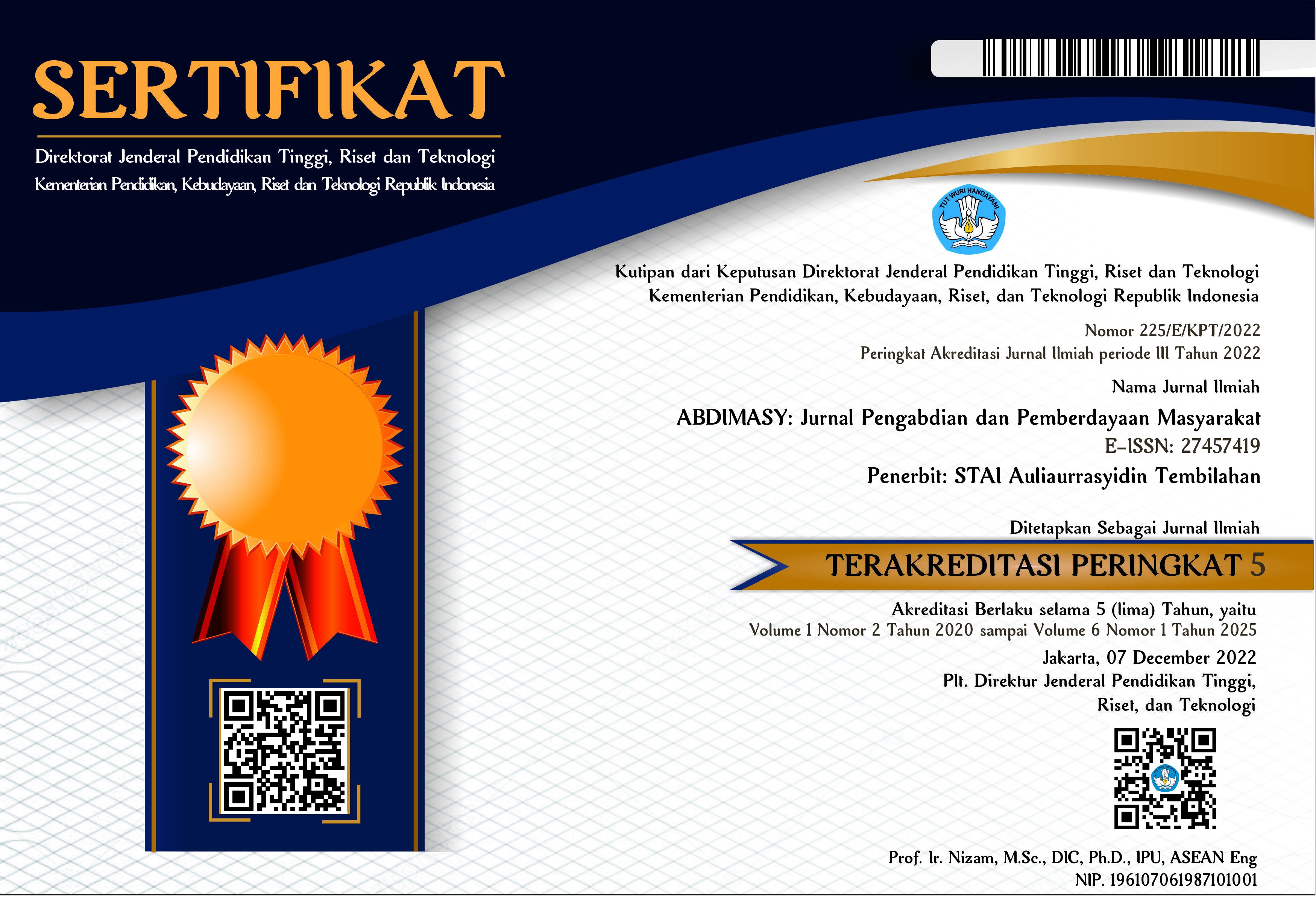New Gen New System (NGNS) sebagai Upaya Pengembangan Kepribadian dan Sistem Pembelajaran Siswa
DOI:
https://doi.org/10.46963/ams.v5i1.1470Keywords:
Community-Based Research (CBR), Cognitive-Behavioral Therapy (CBT), Learning system, PersonalityAbstract
Students' personality can be influenced by the school environment, especially through learning interactions and a conducive classroom atmosphere. The purpose of this service is to develop students' personalities and learning systems at MINU Tambak Sumur, Sidoarjo, East Java, using the Community-Based Research (CBR) method and Cognitive-Behavioral Therapy (CBT) techniques, rewards, and development of learning processes and aspects. The results showed positive developments in student attitudes and improvements in the learning process, although these were not permanent in the classroom and participants were not fully compliant with the techniques provided. Reinforcement of behavior and adherence is essential to sustain such progress.
Downloads
References
Arifin, A. L., & Prihanto, J. B. (2015). Hubungan sarapan pagi dengan konsentrasi siswa di sekolah. Jurnal Pendidikan Olahraga Dan Kesehatan, 3(1), 201–207. http://jurnalmahasiswa.unesa.ac.id/index.php/jurnal-pendidikan-jasmani/article/view/13512
Ariviani, H., Claretta, D., & Achmad, zinal abidin. (2015). Peningkatan Kualitas Belajar Siswa Dengan Teknik Pomodoro. Analisis Standar Pelayanan Minimal Pada Instalasi Rawat Jalan Di RSUD Kota Semarang, 3(November), 103–111.
Astrini, S. R. (2021). Penggunaan Modifikasi Perilaku Tipe Reward Untuk Meningkatkan Motivasi Belajar Anak Usia Dini. Jurnal Golden Age, Universitas Hamzanwadi, 5(2), 104–110.
Bastomi, M., Aisya, A. A., Chayrun Nisa’I, UDiah Putri Suhartatik, Iis Rahmawati, Nanik Fauziah, Nikmatul Hidayah, Rifky Amalya, & Vincencia Carolina Salim. (2022). Penerapan Metode Pomodoro Dan Cornell Notes Guna Meningkatkan Kualitas Belajar Siswa di MI Al-Marhamah. Dinamis: Jurnal Pengabdian Kepada Masyarakat, 2(2), 62–66. http://ejournal.feunhasy.ac.id/dinamis
Dafiq, N. D., Claudia Fariday Dewi, Nai Sema, & Sahrul Salam. (2020). Upaya Edukasi Pencegahan Bullying Pada Siswa Sekolah Menengah Atas Di Kabupaten Manggarai Ntt. Randang Tana - Jurnal Pengabdian Masyarakat, 3(3), 120–129. https://doi.org/10.36928/jrt.v3i3.610
Damaiyanti, S., & Putri, M. (2021). Group Cognitive Behavior Therapy (CBT) terhadap Penurunan Tingkat Kecemasan pada Korban Perilaku Kekerasan (Bullying) di Sekolah Dasar. Jurnal Kesehatan Reproduksi, 8(2), 68–73. https://doi.org/10.22146/jkr.50642
Dewi, S., Lukman, N., & Nana, H. (2018). Strategi Pendidikan Nilai Sebagai Pembentuk Kepribadian Siswa Di Sekolah. Jurnal Bidang Pendidikan Dasar (JBPD), 3(2), 39–46.
Febriantina, S., Riswono, D. A., Aprilia, L., Sabrina, & Ukhfiya, S. (2021). Implementasi Pendidikan Karakter pada Siswa Sekolah Dasar. Jurnal Pedagogik Pendidikan Dasar, 8(1), 16–26. https://doi.org/10.17509/jppd.v8i1.31503
Firdaus, M. R., & Ma’ruf, M. F. (2021). Partisipasi Masyarakat Melalui Program Gerakan Membangun Masyarakat Sehat Pada Pelayanan Kesehatan Di Posyandu (Gerbangmas Siaga) Di Kabupaten Lumajang ( Studi Kasus Pada Gerbangmas Bougenville Rw 20 Kelurahan Citrodiwangsan, Kabupaten Lumajang). Publika, 9(1), 215–226. https://doi.org/10.26740/publika.v9n1.p215-226
Fuadah, Z., Afifulloh, M., & Zakaria, Z. (2020). Penerapan variasi tempat duduk pada pembelajaran tematik di kelas iv MI Tarbiyyatul Arifin Lowoksuruh. JPMI: Jurnal Pendidikan Madrasah Ibtidaiyah, 2(3), 168–175.
Gularso, D., & Indrianawati, M. (2022). Kenakalan Siswa Di Sekolah Dasar. Taman Cendekia: Jurnal Pendidikan Ke-SD-An, 6(1), 54–63. https://doi.org/10.30738/tc.v6i1.12205
Kisno. (2020). Pomodoro Technique For Improving Students’ Reading Ability During COVID-19 Pandemic. Journal Educatuion and Developmention, 8(3), 1–6. https://doi.org/10.37081/ed.v8i3.1753
Nasrudin, F. (2015). Pengaruh pemberian reward dan punishment terhadap motivasi belajar siswa kelas vi SD Negeri di Sekolah Binaan 02 Kecamatan Bumiayu Kabupaten Brebes. In UNNES Repository. https://lib.unnes.ac.id/20269/1/1401411296-s.pdf
Nasution, M. K. (2017). Penggunaan metode pembelajaran dalam peningkatan hasil belajar siswa. STUDIA DIDAKTIKA: Jurnal Ilmiah Bidang Pendidikan, 11(1), 9–16.
Pratama, A. P. (2021). Pengaruh Pembelajaran Daring Terhadap Motivasi Belajar Siswa SD. 2(1), 88–95.
Santia, V., Misdalina, M., & Noviati, N. (2022). Pengaruh Penataan Tempat Duduk Terhadap Hasil Belajar IPA Kelas IV SDN 10 Palembang. Indonesian Research Journal On Education, 3(1), 89–95. https://doi.org/10.31004/irje.v3i1.63
Sitorus, F., Rahmawati, F., Niawati, S., Atika, P., & Pandia, S. (2020). Perkembangan Kepribadian Anak Usia Sekolah Dasar di SDN Socah 2. Prosiding Nasional Pendidikan: LPPM IKIP PGRI Bojonegoro, 1(1), 135–141.
Tarwiyah. (2021). Pelatihan Pembelajaran dengan Metode Pomodoro bagi Siswa SMK Immanuel. Jurnal Publikasi Pengabdian Kepada Masyarakat, 1(2), 10–13.
Yubilia Keysinaya, E. (2022). Peran UNICEF Indonesia Menangani Perundungan di Sekolah Melalui Program Roots. Online) Sospol: Jurnal Sosial Politik, 8(2), 207–224. https://doi.org/10.22219/jurnalsospol.v8i2.22258
Yunistita, Ratna, Sihotang, H. N. J., & Sembiring, E. P. B. D. B. (2022). Penyuluhan Pada Siswa SD Negeri 024868, Binjai Barat Mengenai Pencegahan dan Cara Menghadapi Bullying di Sekolah. Jurnal Pengabdian Masyarakat Bestari, 1(4), 161–166. https://doi.org/10.55927/jpmb.v1i4.827
Downloads
Published
Issue
Section
License
Copyright (c) 2024 Adila Shabira, Ayda Zaqiyatunnisa, Qurrotu Aini, Richa Nur Chasanah, Roudhotul Firdausyi, Sevilla Andina Budi, Shelva Dian Alevia, Dwi Rukma Santi

This work is licensed under a Creative Commons Attribution-ShareAlike 4.0 International License.
Authors who publish with this journal agree to the following terms:
1. Copyright on any article is retained by the author(s).
2. The author grants the journal, right of first publication with the work simultaneously licensed under a Creative Commons Attribution shareAlike 4.0 International License that allows others to share the work with an acknowledgment of the work’s authorship and initial publication in this journal.
3. Authors are able to enter into separate, additional contractual arrangements for the non-exclusive distribution of the journal’s published version of the work (e.g., post it to an institutional repository or publish it in a book), with an acknowledgment of its initial publication in this journal.
4. Authors are permitted and encouraged to post their work online (e.g., in institutional repositories or on their website) prior to and during the submission process, as it can lead to productive exchanges, as well as earlier and greater citation of published work.
5. The article and any associated published material is distributed under the Creative Commons Attribution-ShareAlike 4.0 International License





2.png)



